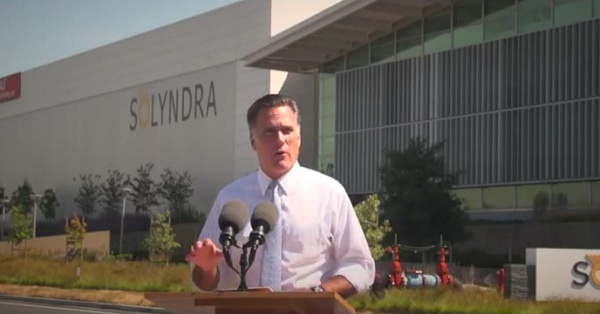Another government-backed U.S. solar power company is in bankruptcy. More trouble for the Obama administration and fodder for the Romney campaign? Actually, it might be the other way around.
Konarka Technologies filed for bankruptcy last week, about the same time presumptive Republican presidential nominee Mitt Romney stood in front of the shuttered Solyndra plant in California, denouncing the Obama administration for its support for the failed solar manufacturer.

The irony, according to the Boston Herald, is that Konarka itself had received public assistance from Massachusetts during Mitt Romney’s tenure as governor.
“The demise of Konarka could become a hot topic on the campaign trail because Romney personally doled out a $1.5 million renewable energy subsidy to the Lowell startup in 2003, shortly after taking office on Beacon Hill,” the Herald reported.
The funding in question was actually in motion before Romney took office, according to the Massachusetts Renewable Energy Trust. But indeed, it was Romney himself who delivered a check from the state to Konarka in January 2003. And, remarkably, Konarka wasn’t the only doomed solar company to benefit from the largesse of the commonwealth that day: according to Politico, Evergreen Solar also “won $2.5 million for a major expansion and to cover operating losses as it tried to become profitable.”
Evergreen would go on to file for bankruptcy in August 2011, just a few weeks before the end came for Solyndra, whose half-billion-dollar federal loan guarantee and subsequent bankruptcy quickly became a cornerstone of Republican attacks against President Barack Obama’s economic and energy policies.
The GOP has been saying the government’s role in developing new technologies should be limited to supporting basic research and calling the administration’s backing of individual companies a misguided attempt at “picking winners.” It’s an argument that could run into trouble given Romney’s approach as governor, which apparently extended beyond Konarka and Evergreen.
Politico reported that after taking office, Romney moved “to take $15 million from Massachusetts’ Renewable Energy Trust Fund — a pot of more than $150 million collected from electricity customers following passage of a 1998 energy deregulation law — and start up a new private venture capital outfit that would back green-minded state businesses with equity, loans and management advice.”
Massachusetts wasn’t alone in backing Konarka. The company’s website lists a long line of successful rounds of private financing that totaled more than $150 million. And government entities from the U.S. Department of Energy to the European Union (the company had operations in Germany as well as Lowell, Mass.) provided funding at various points.

Not entirely unlike Solyndra, Konarka had hoped to succeed by making solar power without silicon at a time when the key material was rising in price and companies were searching for less-expensive manufacturing processes. Konarka’s technology used a photo-reactive polymer material invented by co-founder and Nobel Prize winner Alan Heeger that could be printed or coated inexpensively onto flexible substrates using roll-to-roll manufacturing.
The solar cells that resulted were less efficient, but Konarka thought it could succeed through lower costs and by targeting niche uses for its “Power Plastic” cells, from solar bags to a solar “curtain wall.”